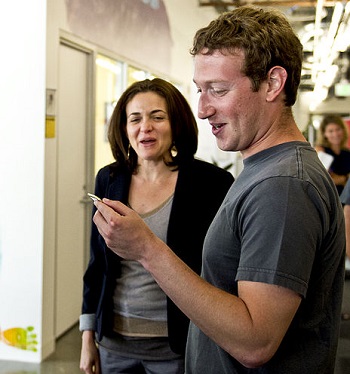The creator of the social network is working hard to fight growing accusations of its role in the election results.
Amidst a rapidly rising body of criticism against Facebook social media marketing, Mark Zuckerberg insists the network isn’t to blame for Donald Trump’s victory. Critics claim that viral fake pro-Trump news stories on Facebook led to the Republican’s election win.
Zuckerberg has responded quite forcefully, saying that he feels the accusation is a “pretty crazy idea.”
Speaking onstage at a recent conference, Zuckerberg addressed the thought that Facebook social media marketing contributed to Donald Trump’s election. “Personally,” he said, “I think the idea that fake news on Facebook, which is a very small amount of the content, influenced the election in any way—I think is a pretty crazy idea. Voters make decisions based on their lived experience.”
Zuckerberg also went on to ask “Why would you think there would be fake news on one side and not the other?”
That has not assuaged the critics insisting Facebook social media marketing doesn’t properly filter fake news.
 Many claim that as the largest social media platform worldwide, viral hoax news posts shared there may have helped Trump to win. The reason, say many, is that Facebook either refuses or is not able to contain the spread of those fake news articles.
Many claim that as the largest social media platform worldwide, viral hoax news posts shared there may have helped Trump to win. The reason, say many, is that Facebook either refuses or is not able to contain the spread of those fake news articles.
Moreover, BuzzFeed News conducted an investigation earlier in 2016 which examined the most right-wing extremely partisan publications published by Facebook pages. They determined that 38 percent of the news shared by those sources was misinformation. That said, when examining the same type of page on the left-wing side, misinformation occurred considerably less: 20 percent of the time.
Those figures may not sound too problematic, but BuzzFeed News also identified another trend with this form of Facebook social media marketing. The stories with the lowest accuracy were the ones BuzzFeed found to generate the largest number of shares and reactions (such as Likes). Inaccurate stories on Facebook pages greatly outperformed publications shared on Facebook pages from more mainstream political news sites. Over the last few months, a rash of hoax news sites were created in order to take advantage of this trend.
Applications are now being used to help enhance the rate of customer engagement while shopping.
Marketers are continuing with their rapid adoption of techniques to reach consumers via smartphone and the popularity of mobile commerce apps is a new reflection of that attitude. A new report suggests that these marketers are using mobile applications as a new way of reaching their target audience.
The report was titled “Quantifying the Rise of Mobile Apps & The Value of Deep Linking.”
That report was published by The Relevancy Group in conjunction with Branch. The research data indicated that almost 45 percent of marketers are now developing and launching mobile commerce apps to enhance customer engagement. Furthermore, over 40 percent of marketers are looking to mobile apps to boost brand loyalty. About that same percentage of marketers are also using applications for the purpose of driving sales.
Marketers recognize the increasing value of mobile commerce apps to drive revenue.
 When asked their opinion about the effectiveness of m-commerce apps in driving revenue, marketers ranked them as fourth on the list of most effective channels. Above applications in terms of their effectiveness were: display advertising, social media marketing and email marketing.
When asked their opinion about the effectiveness of m-commerce apps in driving revenue, marketers ranked them as fourth on the list of most effective channels. Above applications in terms of their effectiveness were: display advertising, social media marketing and email marketing.
According to Branch’s Todd Patton, “Email marketing remains an important part of your marketing efforts.” Furthermore, “Email is the best channel to directly reach potential customers and loyal supporters, “ he said.
At the same time, marketers acknowledge that email marketing can be very effective while at the same time being easy to use. It remains a central marketing tactic for brands due to the simplicity of the tools required in order to reach customers. It is quick, cost effective and it reaches people on virtually any connected device.
A previous Adestra and Ascend2 report called “State of Digital Marketing – Benchmarks for Success,” showed that 61 percent of marketers feel email is the most effective marketing technique. Only 23 percent felt that it was the most challenging tactic to effectively execute.
That said, 38 percent of marketers felt mobile marketing was the most challenging to execute. Still, its effectiveness appears to have made the challenge worthwhile considering the rising number of mobile commerce apps being produced.
 Many claim that as the largest social media platform worldwide, viral hoax news posts shared there may have helped Trump to win. The reason, say many, is that Facebook either refuses or is not able to contain the spread of those fake news articles.
Many claim that as the largest social media platform worldwide, viral hoax news posts shared there may have helped Trump to win. The reason, say many, is that Facebook either refuses or is not able to contain the spread of those fake news articles.
 When asked their opinion about the effectiveness of m-commerce apps in driving revenue, marketers ranked them as fourth on the list of most effective channels. Above applications in terms of their effectiveness were: display advertising,
When asked their opinion about the effectiveness of m-commerce apps in driving revenue, marketers ranked them as fourth on the list of most effective channels. Above applications in terms of their effectiveness were: display advertising, 